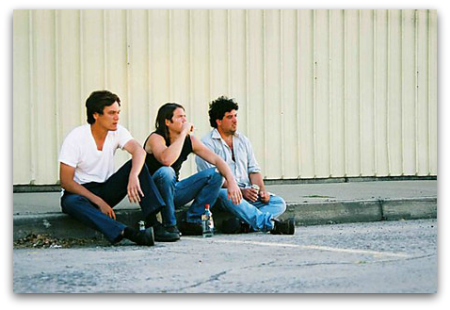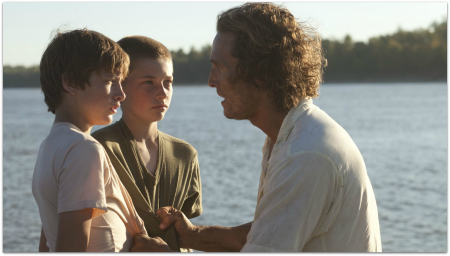Alice Gage on filmmaker Jeff Nichols
‘Is anyone seeing this?’ asks Curtis (Michael Shannon) in Jeff Nichols’ second film, Take Shelter (2011). Curtis has pulled his car over to the side of the road to watch a dry lightning storm approaching ominously from the fields beyond. His wife and daughter are asleep in the back seat and, indeed, no one sees it but him. Curtis’s portentous visions are leaking from his dreams into his days. Is he going crazy, or is he the lone receiver of apparitions of the Apocalypse? And if so, how do you save your family from a gathering storm that appears only to you?
Missteps of dignity and looseness of pride are hallmarks of Nichols’ work, exceptionally executed against a background of the American South by working-class boys and men. They are the rough-hewn sort who believes that ‘a man should take care of his affairs’ – a line repeated throughout his three films, one that means a man’s one vital responsibility is for the world of his family. These are men of few words who wear their grief, anger and humiliation on their brows and show it seldom otherwise. But there is vulnerability behind the glassy stares, and it’s this struggle that makes Nichols’ films so damn pleasurable to watch.

Image from *Shotgun Stories
*
Nichols is a young auteur at 34. He has already produced three exquisite movies, all set in the South, where he was born and raised and refuses to leave. He’s a unique case, rejecting the pull of LA or New York, preferring to write and film what he knows.
His first film, Shotgun Stories (2007), is the tale of three Arkansas brothers. They’re meanly named Son, Boy and Kid by a drunk dad who leaves them before going clean and Christian and starting a new family in the same small town, begetting four more sons but this time with names like Steve and Mark. At this man’s funeral the half-brothers finally blow up at each other after years of building animosity, and spend the rest of the film trying to both kill each other and find peace – often simultaneously. Son, another role played by Shannon, is also trying to save his marriage. At one point during the chaos, his wife looks dumbfounded at nothing in particular, raises her palms and exclaims, ‘Why is this happening?’ To her, this is men’s bullshit gone too far.
The women of Nichols’ films are often at odds with the men, as they watch them atrophying and are forced to pick up the slack. In Take Shelter, my favourite of the three, Curtis appeals to his exasperated wife, Samantha (Jessica Chastain), ‘It’s hard to explain because it’s not just a dream, it’s a feeling.’ Intuition, the traditional realm of the female, has no place here. In this part of the world it’s meant to be the Dorothys who are at risk of supernatural tornados, not the Curtises.
The deaf sign for father, we learn in Curtis’s daughter’s class, is a hand held adjacently to the forehead, fingers outstretched, like the gesture you might use for the crest of a rooster but against the brow. The silliness of the sign and its undermining of the paternal office cause a ripple of snickers as the children and parents practise it together. And we see Curtis’s dignity assailed and restored, again and again, as he does his best to ‘take care of his affairs’. At worst, he wets the bed. At best, his extravagant (to Samantha, paranoid) storm shelter gets a use when one night a tornado siren sounds. For him, the pressure is atmospheric and real – in one scene we see Curtis clutching his daughter in the corner of the living room as the furniture levitates as though in an airlock, his face popping with redness, before everything suddenly drops.
In Mud (2012), the 14-year-old protagonist suffers a similar state of anguish. This is a Tom Sawyer and Huckleberry Finn redux – two modern boys living on the Mississippi who, meeting a criminal on the run and in need of their help, see their ideas of love dashed and remade. Ellis (played by the astonishing Tye Sheridan) is watching his parents’ marriage fall to pieces through chinks in the living-room doorway. He’s a romantic, albeit a tough one, and he wants to believe in the tenants of wedlock. ‘Y’all are married, y’all are meant to love each other,’ he begs. So when Mud – a wizened crim played by Matthew McConaughey – shows up and claims to be on a mission to save the woman he loves, Ellis and his pal Neckbone don’t need any more information. Of course, nothing is as simple as that, and Ellis has to let something die in him before he can begin anew, as a man.

Image from *Mud
*
A word must be said about Michael Shannon. Nichols’ movies are about character first, plot second, and he often writes for specific actors – McConaughey included, but primarily Shannon. The actor seems to be a kind of muse to Nichols; I would even go further and say he is the magic in the alchemy of these films, so innately right are his portrayals. Mud suffers for his diminished role.
The character of the South itself also deserves a mention, with an abundance of locked-off shots of cotton fields, endless skies, and broad, brown rivers. These landscapes say more about their occupants than words can devise, and indeed Nichols’ dialogue is sparse. It’s here that the director is often compared with Terrence Malick, with their mutual obsession with nature, but he refutes it politely. Where Malick is an Impressionist, he says, he is a classic linear storyteller. And where Malick uses an overture of voiceovers in his more recent films, Nichols relies on the mumbled eloquence of country men.
Jeff Nichols shows us this world without the least bit of affectation – an honourable quality in an industry that feels the need to make The Great Gatsby 3D. ‘You can use my VCR if you bring round some Doritos,’ says Son to his brother. And that really is all that needs to be said.
Alice Gage is an editor, writer and producer based in Melbourne. She is the founding editor of


